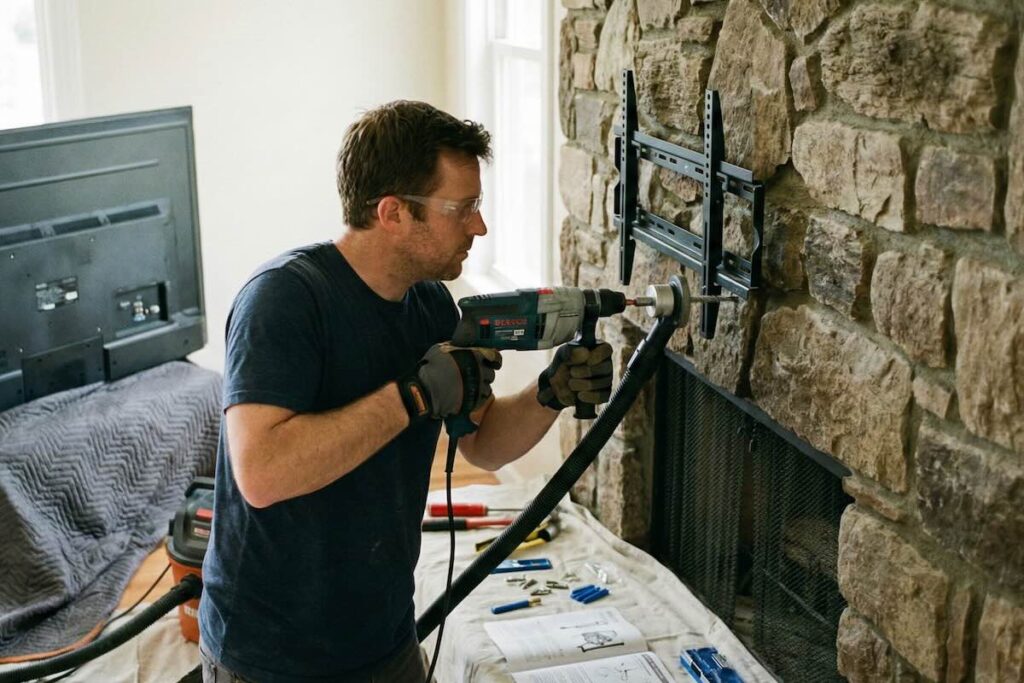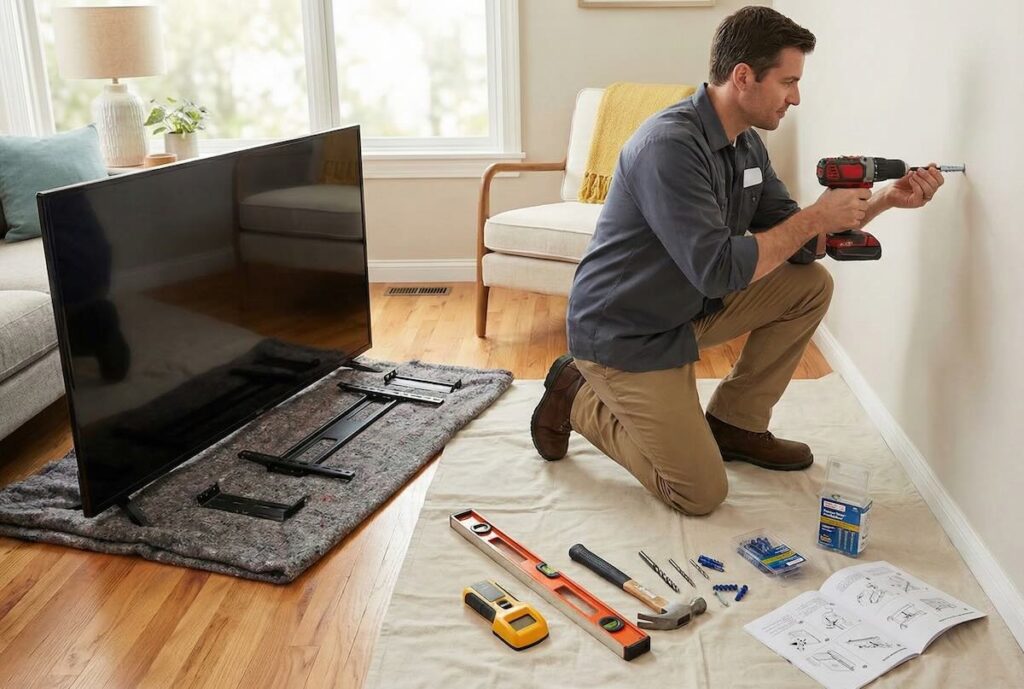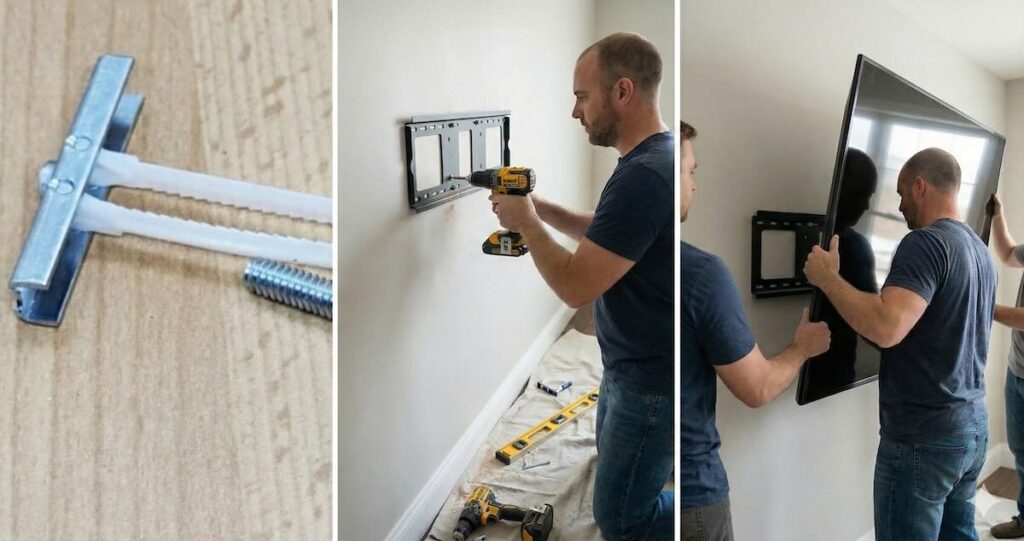
Free 100 Inch TV Mounting Calculator



- 32’
- 100’

- 0’
- 150’

- 4’
- 30’
Your result
01
CalculationRecommended mounting
0 in
?
The recommended height from the floor to the center of your TV screen for the best viewing experience.

TV center height
0 in
?
The recommended height from the floor to the bottom edge of your TV. Helps align your TV properly above furniture.

TV Bottom height
0°
?
The suggested tilt angle of your TV. A slight tilt can improve viewing comfort, especially if your TV is mounted higher.

Tilt angle
Comfort level
?
An indicator of how close your setup is to the ideal viewing angle. "Ideal" means minimum strain on your neck and eyes.

Good
02
TV BracketBest TV brackets for your project
These are trusted brackets, carefully selected to fit perfectly with your project. Reliable, tested, and ready to support your TV—no guesswork needed. Buy safely on Amazon.
03
InstallationMount your TV
These are trusted brackets, carefully selected to fit perfectly with your project. Reliable, tested, and ready to support your TV—no guesswork needed. Buy safely on Amazon.

Do it yourself (DIY)
Do it yourself (DIY) Follow our step-by-step mounting guide made for your exact setup.
- • Interactive checklist
- • Tool recommendations
- • No experience needed

Let our Pros Handle your project
Book with one of our experienced installers near you
- • Trusted, trained technicians
- • Customer-reviewed
- • Upfront pricing before you book
TV mounting height chart for TV Bottom |
TV under 55” |
TV 55-70” |
TV 70-82” |
TV over 82” |
Standard Living roomComfortable level for most couches. |
22-26 inches | 20-24 inches | 18-22 inches | 18-20 inches |
Bedroom (viewing while lying)Install higher for comfortable viewing when lying down. |
45-50 inches | 42-47 inches | 38-43 inches | 35-40 inches |
KitchenHigher placement for easy viewing while standing. |
48-54 inches | 46-52 inches | 44-50 inches | 42-48 inches |
The ideal height for mounting a TV isn’t one-size-fits-all—it varies based on the type of room and the bracket you use. In a living room, the TV should typically be at eye level when you’re seated. But in bedrooms or kitchens, it might be mounted higher for better visibility while lying down or standing.
This is where the type of bracket makes a big difference. For example, a tilting mount allows you to place the TV higher than eye level while still angling the screen down for a comfortable viewing experience. That’s especially useful when wall space or furniture layout limits your mounting options.
By considering both the room layout and the right type of bracket, you can achieve the perfect balance between style, comfort, and picture quality. Our calculator takes all these factors into account to give you the best mounting recommendation—whether it’s for a cozy bedroom setup or a modern kitchen display.
The Best Mounting Height for your 100 inch TV
Mounting Height Recommendations for 100” Screens in Different Rooms
🛋️ Formal Living Room
In large, open-concept spaces, the screen center should generally sit between 39 and 42 inches off the floor. This keeps the center of gravity low, preserves clean sightlines across the space, and prevents the screen from overpowering nearby design elements.
🛏️ Master Bedroom
When mounted in a bedroom, the screen often needs to be placed higher — 52–58 inches to the center — especially if positioned above a low-profile console or built-in. At this height, a tilt mount becomes absolutely necessary to preserve clarity and prevent harsh viewing angles.
🎬 Custom Theater Room
In a high-end theater room, the best height is surprisingly modest: 37–40 inches to center. This height matches the vertical eye line of reclined seating and allows the massive image to feel immersive rather than overwhelming.
Why Standard Mounting Logic Breaks Down at 100 Inches
With a screen that weighs over 120 lbs and covers more than 30 square feet of wall space, you’re not just hanging a TV — you’re performing structural integration. At this size, even a 1-inch error in bracket placement can throw off symmetry or force you to remount entirely. That’s why we give you:
- Precise screen center height based on your seating and room type
- Floor-to-bottom edge distance — for bracket drill accuracy
- Tilt angle recommendation if screen sits above natural eye level
- Adaptive logic if you’re mounting above mantels, custom cabinetry, or on unconventional surfaces
Measure Once, Drill Once — What You Need Before Calculating
➊ Viewing Distance
For a 100-inch display, the recommended viewing range is 12 to 15 feet. Anything closer can feel overwhelming, while greater distances reduce the immersive effect. Our calculator uses this distance to help adjust vertical angle and viewing comfort.
➋ Eye Level Height
Measure the distance from the floor to your eyes while seated or reclined in your usual viewing position. Most fall between 40 and 44 inches. This input defines your ideal center-of-screen height.
➌ Furniture Height (If Applicable)
Mounting above a fireplace, console, or architectural paneling? Measure the top edge of those elements. The calculator incorporates these into your layout to preserve visual balance and ensure the screen doesn’t “float” too high or crowd other features.
➍ Room Type
Our calculator isn’t generic. It adjusts height and angle logic based on room category: living space, bedroom, theater, or presentation area. That ensures the screen fits its environment — both functionally and aesthetically.
Instant Output You Can Rely On
- Exact center height and floor-to-bottom edge in inches
- Whether tilt is needed, and if so — how much
- Positioning logic for above-furniture installs
- Recommendations tailored to your actual layout — not some flat-pack chart
It’s the kind of planning you’d expect from a professional designer or AV contractor — now available instantly, and free.
Heavy-Duty Mount Selection, Curated by Professionals
After calculating your screen position, we help you choose a mount that’s made for 100-inch displays. Not just by weight — but by design. These are mounts used in premium homes, commercial showrooms, and custom media installations. Every recommended option is:
- Rated for 130–170 lbs
- Compatible with ultra-wide VESA mounting patterns
- Selected by our technicians based on years of field-tested installs
- Filtered by use case: fixed for eye-level, tilting for elevated, full-motion for adaptable setups


